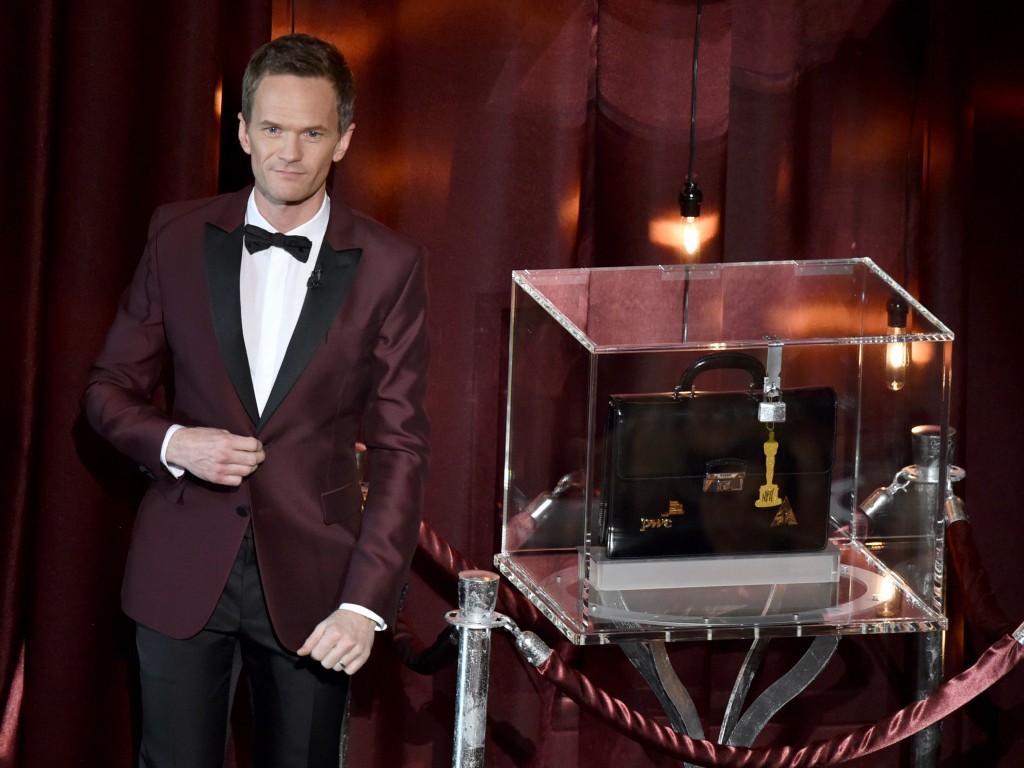
If you’d never watched the Oscars before, you’d be hard pressed to say what the 87th show was trying to accomplish. Neil Patrick Harris made a clear thesis statement that movies are still better than TV, which we all know is false right now. Despite his best efforts, the night turned out to be more about music and politically charged speeches.
While “The Grand Budapest Hotel” and “Birdman” won the most golden statues, the true winners of the night were the causes of immigration reform, gender equality, “weird” equality, racial equality, mental health awareness, ALS awareness, criminal justice and the case for calling your parents. Winners in categories big and small gave moving speeches about these topics.
Before any of the speeches began, though, came Harris, with an underwhelming opening number. There’s no doubt that Harris is the consummate host — he’s talented, and deserved the stage. However, despite his comedic timing and ability to sing and dance, the writing just was not up to par. The opening song, “Moving Pictures,” paid tributes to films of cinema’s past by superimposing the host into movies like “Ghost” and “Star Wars.” While the graphics were impressive, and the stage beautiful, it still wasn’t memorable. Its funniest moment was the mere appearance of Jack Black, and its message came across as simply, “Yay movies.” It’s not bad by any means, but I expected more from the man who brought us “It’s Not Just For Gays Anymore.”
Throughout the rest of the evening, Harris appeared cool, calm and collected, but his jokes continued to fall flat. While his “We are farmers” jingle after J.K. Simmons won was my favorite joke, the Oscars prediction box dragged on so long that I forgot why it even started. By the time he read the envelope, most of the audience had already vacated the premises.
In a similarly cringe-worthy fashion, John Travolta attempted to redeem himself from his notorious mispronunciation of Idina Menzel’s (aka Adele Dazeem) name, but ended up making himself seem even stranger after excessively touching her face. Anything to keep the attention off of the hair plugs, it seems.
The awards themselves were largely predictable. While some thought “Boyhood” should have taken home the big wins for its epic production, “Birdman” was deserving as well. They’re different films, in near-opposite styles, and either would have been a deserving best picture winner. Similarly, while Michael Keaton’s career, humbleness and outstanding performance in “Birdman” got many people to root for him, Eddie Redmayne’s physically transformative performance also deserved a win. Both performances were career highs, and since both Keaton and Redmayne won best actor awards at earlier shows, they weren’t such shocking wins.
While Harris didn’t live up to his predecessor, Ellen DeGeneres and her pizza boy, and there weren’t any truly surprising wins, the musical numbers were the best in recent memory. Rita Ora, Jennifer Hudson, Tim McGraw and Maroon 5 all delivered solid performances accompanied by beautiful set designs. “Everything Is Awesome” was pure fun, and gave “The Lego Movie” the recognition it desperately deserved. While it was a little out of place next to the more serious notes of the night, it was still very entertaining, and livened up the slow middle of the show.
Common and John Legend gave a moving deliverance of “Glory,” the eventual winner of the best original song award. The recreation of the bridge, as well as the imagery of the choir as protestors and their powerful winning speech left an awe-inspiring impression. The commanding performance not only received a standing ovation, but also left snubbed actor David Oyelowo — as well as Chris Pine, among others — in tears. It’s rare to see such true emotion at an awards show, and it was well deserved.
Another highlight of the night was the completely out-of-character performance by Lady Gaga. Stripped down and dressed in a simple yet beautiful gown, Gaga belted out and stunned the crowd with her touching “Sound of Music” medley. Things only got more emotional when a surprise appearance by Julie Andrews brought the crowd to its feet.
The winners touched upon a variety of hot-button topics in eloquent, charming and inspiring speeches. Best supporting actress winner Patricia Arquette (for “Boyhood”) rallied her troops and got Meryl Streep fist pumping to fight for wage equality for women. Graham Moore, winner for best adapted screenplay for “The Imitation Game” gave a touching speech about his struggles and attempted suicide, and learning to love yourself. Simmons, who won for “Whiplash,” spoke about not taking your parents for granted, which left many college students feeling guilty for going a week without calling their moms. Alejandro Gonzalez Inarritu, who won the big three last night for best picture, best director and best original screenplay used his chance at the mic to discuss immigration. Despite Sean Penn’s ill-advised green card remark, Inarritu was able to remind audiences that America is an immigrant nation, and pleaded for better treatment of Mexicans at home and as immigrants. While Redmayne was in a state of adorable disbelief and gratitude, he managed to dedicate his award to those afflicted with ALS.
The Oscars were less about little gags, and more about the serious issues. The Academy was appalled when Marlon Brando refused his Oscar in 1973 to raise awareness of the treatment of Native Americans, and Hollywood shunned Michael Moore for his political remarks regarding the Bush administration when he won for “Bowling for Columbine.” But in 2015, actors are being celebrated for their political activism, and audiences are finally responding positively. While the nominees and Academy alike are still largely male and white, it’s encouraging to see that there are some seeds of change being planted. Maybe next year there won’t need to be a joke about the collection of “the best and whitest.”


